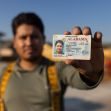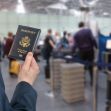Two American citizens who were the subject of a lawsuit filed in 2019 against the U.S. Customs and Border Patrol have reached a settlement deal. The lawsuit was filed by the Immigrants' Rights Project of the American Civil Liberties Union on behalf of Ana Suda and Martha Hernandez.
The two women say they were asked by a U.S. Customs and Border Patrol agent to show ID after the agent heard them speaking Spanish. Both Suda and Hernandez, who live in the small town of Havre, Montana, about 35 south of the U.S.-Canada border, were detained while waiting in line to pay for their groceries in May 2018.
When the incident happened, Suda was able to record it on her cell phone. In the video, you can hear Suda asking the agent why he was questioning them. The agent clearly responds by saying, "Ma'am, the reason I asked for your IDs is because I came in here and saw that you guys were speaking Spanish, which is very unheard of up here." Suda responds by asking if the agent was racially profiling her and her friend. The agent can be heard responding with, "It has nothing to do with that. It has to do with the fact that you were speaking Spanish in the store in a state that is predominantly English-speaking."
Additional Border Patrol agents showed up at the scene, including O'Neill’s supervisor. Suda goes on to ask the supervisor if she and Hernandez would have been questioned if they were speaking French. The supervisor responded, "No. We don't do that."
According to the lawsuit, the U.S. Customs and Border agent, Paul O'Neill, approached the two women without cause and only because he heard them speaking Spanish to one another. The agent then asked the women where they were from. (Suda was born in Texas while Hernandez was born in California).
After asking to see their identification, O'Neill followed up with 40 minutes of questioning, according to the two women. After the intense questioning, the agent let the two women go. However, according to the ACLU, the agent violated the Fourth Amendment rights of the two women as well as their right to equal protection. Under the Fourth Amendment, agents are prohibited from conducting unreasonable searches and seizures.
After the settlement, Suda shared in the following statement, "We stood up to the government because speaking Spanish is not a reason to be racially profiled and harassed. I am proud to be bilingual, and I hope that as a result of this case CBP takes a hard look at its policies and practices. No one else should ever have to go through this again."
Border Patrol shared a statement with CNN in which it defended its agents, stating that agents take special care to enforce laws uniformly and fairly. In the statement, border patrol explains the following: "CBP stresses honor and integrity in every aspect of our mission, and the overwhelming majority of CBP employees and officers perform their duties with honor and distinction, working tirelessly every day to keep our country safe."
As a result of the lawsuit, Border Patrol agents have admitted to racial profiling. Documents produced because of the lawsuit reveal a CBP supervisor as saying, “We have a lot of agents here and nobody really has much to do.”
Neither the ACLU nor the women have disclosed how much was received as part of the settlement.






